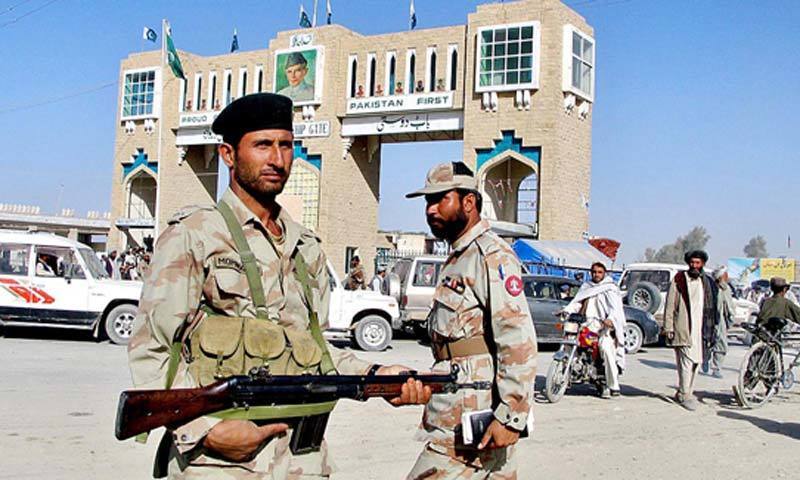Senior Iranian officials and Pakistan’s army chief have expressed concerns regarding border security and said improved measures are needed to keep out "third party" individuals and groups from using Iranian and Pakistani soil to plot attacks against one another.
“The borders between Iran and Pakistan should be frontiers of friendship, development and tourism between the two nations, and we should not allow some terrorist groups [to] promote insecurity in these borders," Iran’s President Hassan Rouhani told Chief of Army Staff of the Pakistan Army General Qamar Javed Bajwa on November 7, according to a statement posted on the president’s website.
Bajwa arrived in Tehran on Monday with a high-ranking Pakistani delegation for what was a three-day visit to discuss bilateral defense cooperation and border security.
During his meetings with Iran’s Defense Minister Brigadier General Amir Hatami, Bawja is said to have highlighted recent improvements in border operations by Pakistan on the Pakistan-Afghanistan border, cautioning that terrorists were likely to now move to exploit the Pakistan-Iran border.
Bajwa also held separate talks with Foreign Minister Mohammad Javad Zarif and Major General Mohammad Baqeri, the chief of staff of the Iranian armed forces, and Commander of the Islamic Revolution Guards Corps Major General Mohammad Ali Jafari.
The two sides agreed to establish a hotline for easy communication between their respective field commanders stationed along the border. Other arrangements expected to be put into place include fencing by Iran on its side of the border, coordinated border patrolling, intelligence sharing, and more frequent interactions between units.
For decades, Iranian-Pakistani relations have had mixed elements of competition and cooperation. Tensions arose from rivalry for regional influence, differing postures toward the United States, or the sectarian divide between majority-Sunni Pakistan and Shia Iran.
However, cross-border attacks in recent years in Baluchistan province in Pakistan and Sistan-e-Baluchistan in Iran brought the two sides closer together with common interests to fight against rebel attacks, drug smuggling, kidnapping and other criminal network activities that take place in the region.
The two countries share a 917 km (570 mi) border, and cross-border attacks by militants have long been a serious irritant for both countries. Iran frequently complains to Pakistan about foreign-backed terrorists that use the Pakistan’s border regions to launch attacks in southeastern Iran.
The two countries suffer from frequent attacks by militant and separatist extremist groups that have used the area as a base for Balochi nationalist-separatist activity. The Pakistani Balochi militias are allied with ethnic kinsmen on the Iranian side, often engaging in kidnapping, terrorism and drug smuggling.
Besides Jaish al-Adl, other rebel groups operating in the border regions include the Baluch nationalist group Jundallah, and Harakat Ansar Iran, one of two groups that had split from Jundallah. In 2013, the group merged with another faction to form yet another Baluch militant group, called Ansar Al-Furqan.
On March 11, 2017, Iran and Pakistan set up a joint border commission to address bilateral issues, a day after Pakistan summoned the Iranian ambassador to express its concern over remarks made by Iran’s army chief that Tehran will hit terrorist "safe havens" inside Pakistan until Islamabad takes steps to stop militants from carrying out cross-border attacks.
Both countries have also grown closer due to President Donald’s posture toward Iran and his rhetoric towards Pakistan when discussing its counter-terrorism efforts.







 Azerbaijan and Armenia started the process of demarcation of their border on Tuesday, with the installation of the first border markers based on ge...
Azerbaijan and Armenia started the process of demarcation of their border on Tuesday, with the installation of the first border markers based on ge...
 President Aliyev emphasized the critical role of the North-South Transport Corridor in fostering transport cooperation between Azerbaijan and Russi...
President Aliyev emphasized the critical role of the North-South Transport Corridor in fostering transport cooperation between Azerbaijan and Russi...
 Armenian sappers commenced on Monday mine-clearance operations in the territories adjacent to the Saint Mary Church in village of Voskepar (Armenia...
Armenian sappers commenced on Monday mine-clearance operations in the territories adjacent to the Saint Mary Church in village of Voskepar (Armenia...
 Russian Foreign Minister Sergei Lavrov has reasserted that Moscow has no intentions to stop the fighting in Ukraine, even if peace talks commence.
Russian Foreign Minister Sergei Lavrov has reasserted that Moscow has no intentions to stop the fighting in Ukraine, even if peace talks commence.



